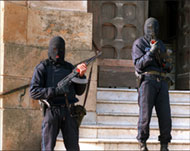Algerian amnesty takes effect
Algeria will pardon or reduce sentences for more than 2000 convicted or suspected Muslim fighters, the Justice Ministry has said, moving ahead with a government effort to turn the page on a brutal insurgency.

About 2100 suspects will benefit from pardons or an end to legal proceedings they faced, Abdelkader Sahraoui, the ministry’s chief of staff, said on state radio on Thursday.
Another 100 fighters, convicted of severe crimes, will have their sentences reduced, he said.
The measures, which stem from a national reconciliation plan that was overwhelmingly approved in a September referendum, take effect immediately, Sahraoui said.
There were conflicting media reports about hundreds more terrorism convicts. Independent dailies El-Watan and Liberte quoted Sahraoui as saying on Wednesday that another 800 people would have their sentences reduced.
El-Watan said they were terrorists implicated in bombings in public areas, massacres and rapes.
Sahraoui did not mention those 800 on Chaine-3 radio.
The news reports said that pardons were limited to those accused of supporting or financing terrorism and that amnesty would not be offered to those who directly participated in attacks during the insurgency that left an estimated 200,000 dead according to international human-rights groups.
Strong criticism
Critics have said that the Charter for Peace and National Reconciliation – the brainchild of Abdelaziz Bouteflika, the Algerian president – seeks to whitewash years of agony and will hinder the ability of victims to obtain real justice.
There are fears that releasing extremists and allowing them home from exile could plant the seeds of future violence.
 |
|
Algeria crushed a Muslim uprising |
Four human-rights groups warned on Thursday that the presidential decree “will consecrate impunity for crimes under international law and other human-rights abuses, and even muzzle open debate by criminalising public discussion about the nation’s decade-long conflict”.
Amnesty International, Human Rights Watch, the International Centre for Transitional Justice, and the International Federation for Human Rights said in a joint statement: “To date, Algerian authorities have largely failed to investigate the human-rights abuses committed both by armed groups and state security forces.”
“Rather than moving to prevent future abuses by ending this de facto impunity, Algerian authorities have now decreed a broad amnesty for past abuses.
Families
Ali Merabet, who leads an association of victims’ families, said he knew of no relatives who were happy with the reconciliation effort.
“There is everything that we wanted in the text – except reconciliation,” he told The Associated Press.
 |
|
An estimated 200,000 Algerians |
Reconciliation, he added, must take place “directly between those behind the acts of terrorism and the victims or their relatives”.
The charter gave amnesty to a broad span of Muslim insurgents, from fighters to those who provided logistical support.
Legislation to implement the charter’s provisions became effective on Monday, said Sahraoui.
Liberte reported that judicial officials were ordered to promptly apply its provisions – and some were already on Wednesday ordering prisoner releases.
The insurgency started in 1992 when the army cancelled a second round of voting in Algeria’s first multi-party legislative elections to thwart a likely victory by the now-banned Islamic Salvation Front.
Daily beheadings and massacres committed by Muslim insurgents followed. Tens of thousands of civilians were killed.
Government security forces were accused of having at least a passive role in some of the bloodshed.